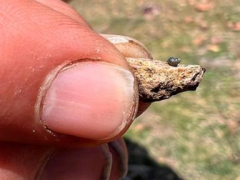Seven-year-old Mariam was excited. Her mother had dressed her up in her favourite powder pink frock, with her hair in two pigtails held with butterfly clips, and had told her she would be going to a surprise birthday party for her cousin.
Instead, her aunt took Mariam, holding hands, to a worn-down building with layers of peeling walls and a cold metal table waiting inside.
There, a curly-haired old woman softly murmured reassurances that Mariam didn’t understand, grabbed her and restrained her on the table. Then the pain started – it was sharp, searing, unforgettable. The next 20 minutes would split her life into a “before” and “after” – and shatter her trust in the person she most believed in: her mother.
Two decades later, the 27-year-old survivor of female genital mutilation (FGM) still bears the scars from that day. “I feel like something is missing inside me. It’s as if something has been taken away, and that has turned into a negative part of my body.”
“It is an emotional deficiency. You are not able to describe your emotions when talking about sexual needs,” she says. “When looking for a mate,” she adds, “you have a deficiency in [your] emotional and sexual response”.
Mariam belongs to Pakistan’s Dawoodi Bohras, a sect of Shia Muslims mostly from the Gujarat region, among whom FGM is a common practice. Estimates suggest that between 75 percent and 85 percent of Dawoodi Bohra women in Pakistan undergo FGM either in private residences by older women – without any anaesthesia and with unsterilised tools – or by medical professionals in urban centres like Karachi. Pakistan has a Dawoodi Bohra population of an estimated 100,000 people.
Yet, many Pakistanis remain unaware that the practice is common in their country. Even as FGM in parts of Africa garners global headlines, a culture of silence in Pakistan means that the practice has largely gone on, unchecked by public scrutiny or legal intervention.
A shroud of secrecy shields the ritual, and Pakistan has no comprehensive national data on how widespread FGM is. Girls are subjected to FGM at an age when it is difficult for them to process it on their own. And the Dawoodi Bohra community does not even refer to the removal of the clitoral hood as mutilation – they call it circumcision, a rite of passage that must be gone through – that must not be questioned.
Women who choose to speak out against this practice are at times threatened with excommunication from the community. “When you question an authority, you are shown the way out,” says Mariam.
“Where will you go? You were born here.”
Resistance to an enduring practice
“Your parents want what’s best for you.” It’s a belief children hold tightly – until it breaks. As it did for Aaliya.
The 26-year-old remembers fragments of a process so painful that for years, it felt like a bad dream, too cruel to be real.
But the truth has lingered in flashes: the cold, unyielding table, the whispered promises that this was “necessary,” the sharp, physical and emotional, sting. “It felt like a bad dream, like it couldn’t have happened,” she says, her voice wavering with the shock of a trauma she did not understand at the time.
Fear was the emotion she felt while lying on the metal table. Betrayal is what she felt afterwards, along with excruciating pain. “What blows my mind is there’s an entire generation of people that are willing to do this to a child without even knowing why,” says Aaliya.
Globally, the push to end FGM has gained steam in recent years. Earlier this year, the Gambian parliament rejected a controversial bill to quash a 2015 ban on FGM.
But the Dawoodi Bohra community has so far stuck to the practice. In April 2016, Syedna Mufaddal Saifuddin, the current global leader of the Bohras reaffirmed the need for female circumcision, or khatna, in his sermon at Mumbai’s Saifee Masjid, despite increasing opposition from within the community and across the world.
“It must be done… if it is a woman, it must be discreet,” Saifuddin said, insisting that it was beneficial for both body and soul.
Doctors say, however, that FGM can lead to reproductive complications in women.
“Young girls can have an abscess, urinary complaints; they can face a multitude of issues in their ma




